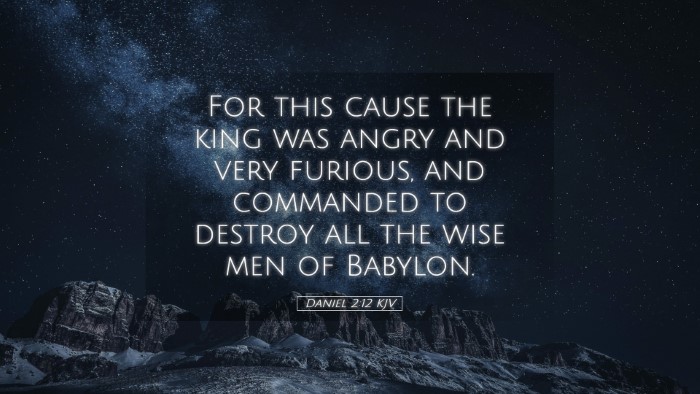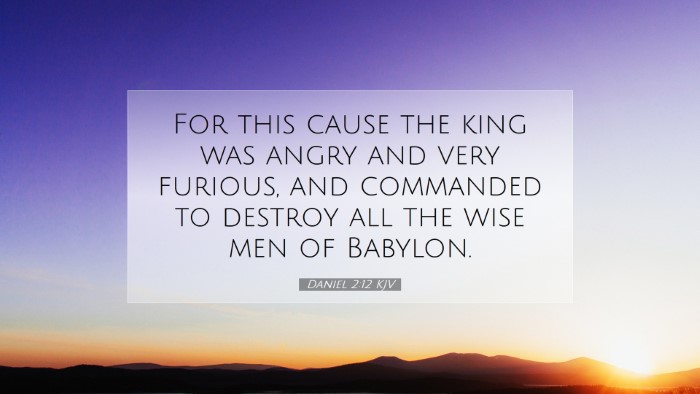Commentary on Daniel 2:12
Bible Verse: Daniel 2:12 - "For this cause the king was angry and very furious, and commanded to destroy all the wise men of Babylon."
Introduction
This verse marks a critical juncture in the narrative of the Book of Daniel. It highlights the intense emotions of King Nebuchadnezzar as well as the peril faced by the wise men of Babylon. To fully appreciate this passage, we will explore various dimensions, including historical context, theological implications, and moral significance, drawing insights from esteemed public domain commentaries.
Context and Background
The historical setting of Daniel 2 takes us to Babylon during the reign of King Nebuchadnezzar II. After a troubling dream, the king demands interpretations from his wise men, who subsequently fail to provide an answer. This failure incites the king's rage, leading him to issue a decree for their execution. Understanding this context is crucial for interpreting the significance of verse 12.
Insights from Albert Barnes
Albert Barnes emphasizes the king's fury in this passage as an illustration of the volatile nature of absolute power. He remarks:
- Anger of Nebuchadnezzar: The king's anger serves as a warning that those in positions of authority can be easily swayed by perceived failures of their subordinates.
- Desperation of the Wise Men: The wise men’s desperation reflects the dire consequences of failing to meet the expectations of those in power.
Barnes notes the chilling consequences of refusing to acknowledge one's inability, suggesting that the wise men, in their throw of caution to the wind, put themselves in grave danger.
Matthew Henry's Perspective
Matthew Henry, in his renowned commentary, offers a comprehensive examination of this verse
- The King's Response: Henry interprets Nebuchadnezzar's response as indicative of his character, which is governed by pride and a demand for respect and acknowledgment.
- Fury and Consequence: He points out that the intensity of the king's fury reveals not only his own fears but also reflects the precariousness of the wise men’s positions.
Henry also provides an admonition regarding those who read this passage:
- Moral Lessons: The failures of the wise men serve as a reminder to individuals of the importance of reliance on divine revelation rather than human wisdom.
Adam Clarke's Commentary
Adam Clarke offers a detailed analysis of the motivations and implications behind the anger of Nebuchadnezzar:
- Significance of Dreams: Clarke highlights the interpretive importance of dreams in Babylonian culture, suggesting that the failure to interpret the king’s dream was viewed as a direct challenge to the very fabric of their societal order.
- Sovereign Power: The king's command to slay the wise men showcases the extreme measures that kings might resort to when their authority is questioned.
Clarke further suggests that God uses such desperate situations to manifest His power and sovereignty through unlikely means, which eventually is seen in Daniel's intervention.
Theological Implications
One theological insight drawn from this text is the nature of divine sovereignty and the human condition. The juxtaposition of human wisdom failing in the face of divine mystery underscores the limitations of earthly counsel:
- Human Wisdom vs. Divine Revelation: The wise men, representing the apex of human understanding, find themselves helpless when faced with the supernatural.
- God's Control Over Nations: The passage demonstrates that God’s control extends even to the kings and rulers of nations, who ultimately cannot exert control over the divine will.
Moral Reflections
Pastors and theologians might reflect on the moral lessons embedded in this narrative:
- The Consequences of Accountability: Nebuchadnezzar’s reaction serves as a stark reminder of the consequences individuals face for failing to fulfill their roles.
- The Need for Faithfulness: The wise men’s plight calls to mind the necessity for faithfulness in one’s duties, recognizing the importance of divine assistance in all endeavors.
- The Value of Prayer and Discernment: The unfolding events following this decree stress the importance of turning to God for wisdom and understanding when faced with dire situations.
Conclusion
In summarizing Daniel 2:12, we find a narrative rich with lessons on authority, the fragility of human wisdom, and the necessity for divine intervention. Commentators such as Albert Barnes, Matthew Henry, and Adam Clarke bring forth valuable insights that emphasize the abiding truths of God’s sovereignty in the midst of human despair.
As we consider the implications of this verse, it serves as both a cautionary tale and an encouragement—a testament to the reality that, regardless of the chaos, God remains in control, orchestrating events towards His divine purposes.


